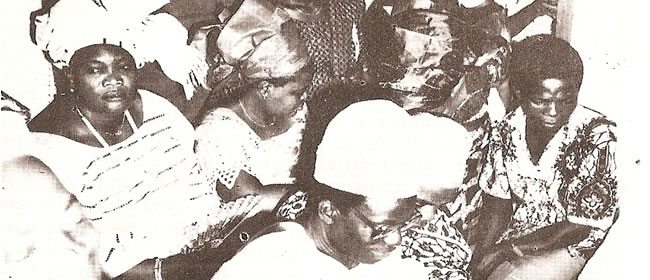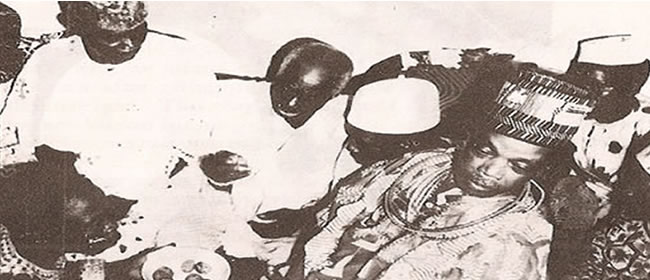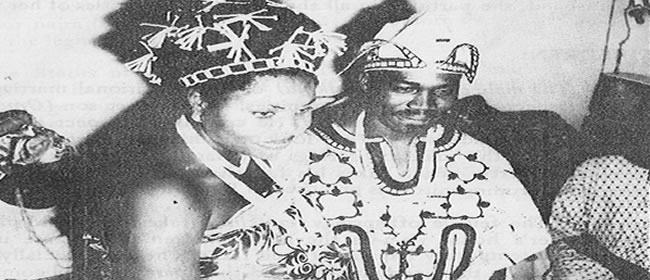In the olden days, the Bini attach much importance to Infant marriage. Infant marriage is the betrothal of a girl of tender age say, six to ten years to a man
and later on when she attains adulthood, the man whom she is betrothed marries her after paying dowry. The girl normally stays with her parents at betrothal period.
Choice of Partners: The choice of a partner is made either by the parents of a would-be-couple or an adult male who wants to contract a marriage with an infant. Generally, the suitor’s father chooses a girl for his son after giving due consideration to the family background of the little girl. This may be borne out of a strong desire by a father to reward his son for his past services to him. Besides, parents are also obliged to contract marriage for their children as soon as they are of age.

Cross section of the family of the Bridegroom negotation process
The father of an infant child may decide to choose a partner for his daughter from a family with which he has had strong relationship. He may also consider the personal character and industry of the would-be-Bridegroom. In some clans, such as Udo, some parents used to betroth their daughters to Chiefs in order to secure Chieftaincy titles from the Iyase of Udo.
The Negotiation Process: The suitor begins the negotiation by taking a bundle of fire-wood (Ukerhan to the house where a little baby girl is delivered. As soon as he gets there, he puts the bundle of firewood down at the backyard of the house as a primary indication of his intention to marry the baby-girl. The acceptance of this gift of fire-wood by her parents also indicates their acceptance of him and this therefore opens the door to further negotiation.
As soon as the fire-wood is accepted, the suitor’s father presents four kola-nuts, a bottle of native gin, a keg of palm-wine and forty (40k) kobo to the baby’s parents. These are shared amongst the people in the house. The acceptance of’ the kola-nuts, drinks forty (40k) kobo and the fire-wood further strengthens the position of the suitor. This will prevent other people from showing interest in the girl.
As the girl gets matured, the service of a middleman is required to help in the final negotiation with the girl’s family. Meanwhile, the suitor and his kinsmen and women assist the father of the would-be bride in his farming duties. This form of service must be given by aII serious-minded suitors.
When the girl is of age, the suitor and his relatives go to his would be-father-in-law to finalize arrangements for the wedding of his daughter. As in the adult marriage system, the girl’s father presents the visitors with four (4) kola-nuts which are broken after saying some prayers. The middleman later discloses the purpose of their visit which is to remind the girl’s father of the suitor’s intention to marry his daughter. After this formality, the suitor presents his would-be in-law with four kola nuts, a keg of palm-wine, native-tobacco and a bottle of native gin.
Relationship between Families: Mutual relationship is encouraged between both families concerned. The suitor’s father makes it a point of duty to pay his would-be. In-laws frequent visits. They could even go to the extent of assisting one another financially as occasion demands. Disputes or misunderstandings amongst members of the two families are settled amicably and without prejudice.

Breaking of kolanuts by the eldest man in the family of the Bride
Courtship: The duration of the courtship period in the infant marriage system is longer than that of the adult type. This is due to the fact that the girl is invariably still too young to understand marriage and its essence at the time marriage interest is expressed. Preliminary courtship is done by her would-be-father in-law on behalf of her would-be groom. He visits his in-laws frequently and on such occasions studies the behaviour of the would-be-Bride.
The actual courtship by the suitor herself starts when the girl is of age. They are also formally introduced to each other by their parents. The suitor then visits his in-laws regularly to acquaint himself with his future partner and members of her family. Occasionally, the girl is invited by her father to present her suitor with drinks and kola nut during such visits. The idea is to bring her closer to him and to enable them study each other closely.
The suitor or his father is expected to present gifts to his in-laws to be annually during the courtship period. In Usen, for example, the suitor or his father is obliged to send nine tubers of yams, a keg of palm-wine and nine legs of the antelope to his father-in-law and seven tubers of yam and a tin of palm-oil to his mother-in-law during annual festivals. The girl is allowed to visit her mother-in-law to-be occasionally to enable her get used to members of the family. She is not expected to engage in sexual intercourse during this period.
Bride-Price: As in adult marriage, Bride-price is usually paid in the house of the eldest man in the Bride’s family. But unlike what obtains in adult marriage. What is paid as bride-price is determined on the basis of the long period of meritorious service by the suitor to his father-in-law. Thus, in Udo, Ishiohor, Utekon, Egbeta, Urhonigbe and Isi, for instance, Bridegrooms were merely required to pay sixty (60) cowries, equivalent of present day three
naira (N3.00), ten yards of white
cloth, four kola-nuts, and a bottle of hot drink which were meant for the Bride’s father.

The Bride and Bridegroom standing while they were been blessed
Today, the value of bride-price varies from one family to another. It is now between twenty (20) and forty (40) naira and this amount is given to the Bride’s father which he shares among members of his family. The Bridegroom also gives the sum of twenty naira each to the Bride and her mother. The female and male relations of the bride, Ibieguae are given ten (N10) naira to share.
Dowry: This also differs from one family to another. But the Bride’s parents normally equip her with clothes, gold ornaments, brooms, and domestic utensils. Husbands tend to attach much importance to the amount of dowry brought by their wives. In order words, some husbands use it as an index of measuring the level of affluence of their in-laws. Therefore, those who bring a sizeable amount of dowry from home are usually well respected by their husbands.
“Imie-Omo” Ceremony: Unlike the adult marriage, the “Imie-Omo ceremony is separated from the occasion of the payment of the bride-price. However, details of activities during the ceremony remain the same as in adult marriage. Ceremonies associated with the movement of the bride to the husband’s house are same as in adult marriage.